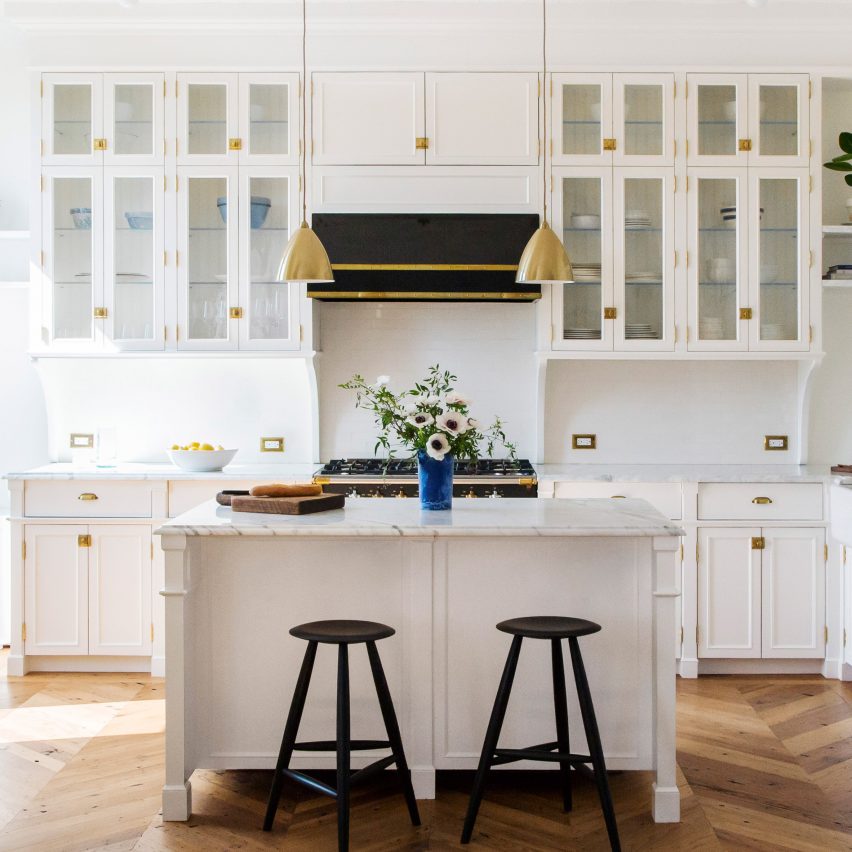The founders of Brooklyn design studio White Arrow have transformed a landmarked building into a bright home for themselves in the New York borough's Williamsburg neighbourhood.
The Historic Schoolhouse apartment was designed by, and for, partners Keren and Thomas Richter of White Arrow.
The centuries-old red brick building situated on South 8th Street is Romanesque Revival, and a New York City landmark designated by the Landmarks Preservation Commission.
Measuring 2,000 square feet (186 square metres), the space was formerly part of Long Island Business College, then used as artist lofts during the 1980s.
The entire interior was gutted, and new period details were added to complement the building's original character, as previously the bare space was lacking in character.
"To celebrate the heritage of a landmarked 1800s Brooklyn schoolhouse, we transformed a utilitarian artist loft into a glamorous home, rich with period appropriate detail," said White Arrow.
The studio worked with local architect Kevin Greenberg at Space Exploration and contractor Tristan Warner to transform the listed property into a spacious city home with a kitchen, dining, and living areas.
Architectural details like crown moulding and archways were added to complement the detailed exterior, while white surfaces amplify the contemporary interiors.
The new space is "a home rooted in its past but updated with modern conveniences and a distinctly artistic point of view", said White Arrow.
Overall, the interior decor makes a subtle reference to Mediterranean design, with bright whites and blues throughout the light-filled spaces.
A palm tree forms a focal point in the living room, alongside two white sofas and two soft pink chairs. A blue-and-glass coffee table is placed in the centre of the room, with a cobalt blue and white chaise lounge next to a fireplace.
Three windows have been re-defined and unified with a new arched moulding that mirrors a detail on the exterior.
The kitchen is also framed by an arch, and is marked by white cabinets and white marble countertops. Reclaimed chestnut laid in a chevron parquet pattern covers the floor, and cabinets have golden nobs that adding more touches of warmth to the space.
"Inspired by the building's character, we designed custom Victorian millwork and tracked down the original tin ceiling tiles," said the studio. "We utilised salvaged doors and hardware, antique earthenware sinks and claw foot tubs."
In one bathroom, blue-coloured Delft ceramic tiles from the 1700s line the walls and a white mosaic covers the floor. A set of cobalt blue doors link with the coastal-themed decor.
Calcified-lime plaster walls are used in both bathrooms to add lightness and texture. In a second bathroom, a custom-designed glass framed wall encloses a claw-foot tub and shower with blue floor tiles from Morocco.
Metallic gold wallpaper reflects sunlight in one bedroom, while the other features a black canopy bed and dark teal walls.
A large, custom-designed dressing room is painted white with gold details and glass cabinets similar to the kitchen. A large ladder rolls across a floor-to-ceiling storage area.
Williamsburg has become an increasingly desirable neighbourhood over the past decade, and other renovations in the area range from the overhaul of a brick townhouse and the ongoing transformation of the huge Domino Sugar Factory site.
Photography is by White Arrow.

